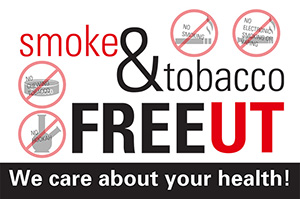Who is affected by this policy?
This policy applies to anyone who is on UT’s campus. This includes students, faculty, staff, visitors, contractors, services representatives, volunteers and alumni.
What areas are included in the policy?
This policy is in effect for all indoor and outdoor spaces on the entire campus.
Do I have to quit?
No. Quitting is your personal choice. This prohibits the use and possession of tobacco, vape or hemp-based THC or other intoxicant products while on campus. Those under 21 need to understand that tobacco and vape products are illegal for them to use, however. If someone has an interest in quitting, free cessation programs are offered. Please call (813) 257-1877 to learn about cessation classes.
At the current time, intoxicating THC products derived from hemp and other intoxicating cannabinoids made from hemp are legal in Florida. Choosing to use these products elsewhere is your choice, however, you may not possess or use them on UT’s campus. Students who are in need of assistance in quitting THC or hemp-based intoxicant cannabinoid products can contact Counseling Services for assistance.
What do I do if I see someone breaking the policy?
Compliance is everyone’s responsibility. If you feel comfortable doing so, you can approach the violator in a kind way letting them know that we are a tobacco and vape-free campus, or that hemp-derived intoxicant products are prohibited on UT’s campus. If you are not comfortable or see the same person continuously violating, you can call Campus Safety at (813) 257-7777.
How is the policy enforced?
If possession or use of these products rises to the level of being reported to Campus Safety, Student Conduct or Human Resources, each department will follow their set procedures and deal with individuals on a case-by-case basis.
What is UT doing to help someone who wants to quit these products?
The University offers free smoking cessation classes to all students, faculty, staff and the community free of charge. The smoking cessation class involves setting a quit date and receiving four free weeks of nicotine replacement therapy (the patch, gum, etc.). To sign up, email wellness@ut.edu or call the Wellness Center at (813) 257-1877.
Counseling Services are available for anyone wishing to quit any hemp-based intoxicant product or THC product.
Additional free classes within the community can be found at I Quit with AHEC.
Delta-8 and other hemp-derived products are legal. Why are they prohibited on UT’s campus?
Based on recent trends regarding adverse physical and psychological health, as well as increased reports to the FDA and poison control centers, UT is addressing this as a public health issue to protect the campus community. These products have psychoactive and intoxicant properties present and are not regulated by the FDA for safe use. In addition, there is variability in product formulations, concentrations of THC and product labeling which can cause problems for consumers. For more information please see:
5 Things to Know About Delta-8 Tetrahydrocannabinol – Delta-8 THC.” US Food and Drug Association
Are all hemp products prohibited?
No, only those with psychoactive and intoxicant properties as listed in the policy above.



